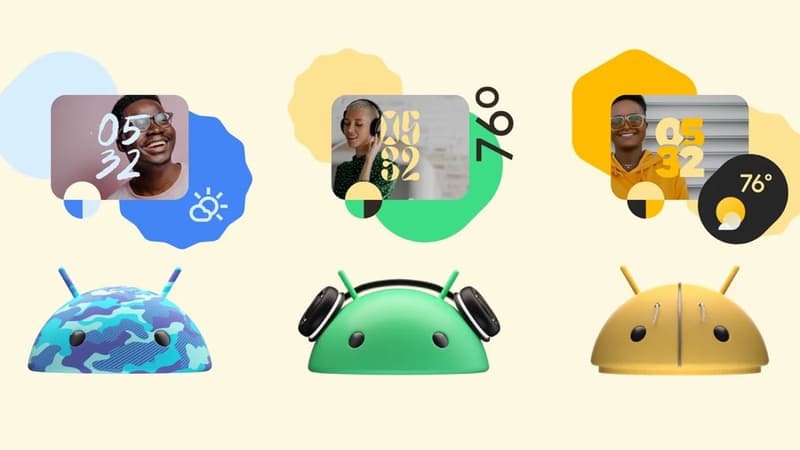Pixel smartphones, artificial intelligence in abundance, a lot of Bard, the home chatbot: the Google I/O conference held this week in Mountain View (California) delighted thousands of developers present, changing their habits a bit.
Usually the center of attention, Android has largely moved into the background of the event show that is traditionally and essentially meant for it. However, Android 14 was there. The operating system for smartphones and tablets, but also in versions adapted for the home or car, has had its share of novelties. They have been, it is true, less numerous than usual and far from being revolutionary.
An even more personal smartphone
The more than three billion active devices in the world will focus primarily on personalization next fall for OS deployment. And unsurprisingly, it’s the AI that will stick with it to customize your experience from start to finish. Two years after the release of Material You, which notably allows you to adjust your screen to your tastes and colorimetric desires, Android 14 goes to the next level.
On the locked home screen, it will now be possible to choose a funnier clock face from the wide variety offered and the arrival of a global monochrome theme that will also apply to the smartphone’s icons, windows and menus.
The wallpaper also adapts to the user who can also choose to put emojis, change the size, pattern or color. The cinematic wallpaper is also coming and shows that AI can transform your most beautiful photos into 3D images that come to life before your eyes depending on the viewing angle.
And if you’re even more inspired, the generative AI wallpaper will offer text image templates to generate unique backgrounds that can then be modified. Android’s color palette will also be able to automatically match your images to the tones in the photo.
More support, fewer lost devices
Google is also beefing up its app.”Find my device” allowing you to quickly find any lost compatible products (Pixel smartphone, Pixel Buds earphones, etc.). All you have to do is find where you are and rely on the help of all Android devices to scan the area around your smartphone or headset, locate it, and return it to its position. The app will also enable, starting this summer, support for a greater number of devices, all brands combined, from headsets to tablets and beyond. They will all appear in Find My Device.
Google also returned to the partnership with Apple to prevent inadvertent tracking by Bluetooth beacons such as AirTags. In a few months, the smartphone will send a notification if it detects tracking by an unrecognized device, previously in your bag or pocket, and will help you find the tracker. It will then be checked and disabled.
A hand-in-hand agreement to develop a common technology standard for tracker identification. But a very targeted agreement, because at the same time, Google did not fail to remind its Californian neighbor that it would be good if their iPhones also integrated the RCS protocol, which replaces SMS to integrate options such as sending videos or emojis. This would have the effect of simplifying group conversations without worrying about the devices used, and of ending the coexistence between the famous blue bubbles (for those who use iMessage) and green bubbles.
Google has also insisted on optimizing more than 50 Google apps, including Gmail, Photos, and Meet, as well as third-party apps (Disney+, Spotify, Minecraft, etc.). Now they will bring more fluidity, they can be used without problems on all screen sizes, whether it is for the Pixel 7a (already available), the Pixel Tablet or even, and above all, the Pixel Fold, the first recently introduced folding smartphone.
Android 14 will also make some advances, notably on the Fast Pair feature that allows you to immediately pair headphones or other accessories with your Android smartphone by bringing them closer to your mobile phone. More than 300 headphones and earphones will be compatible with the simplified Bluetooth connection function. Near Share, for quick and easy file sharing between smartphones, tablets, and Chromebooks, is getting better. In particular, it will integrate Windows PCs into the list of supported products.
Source: BFM TV


